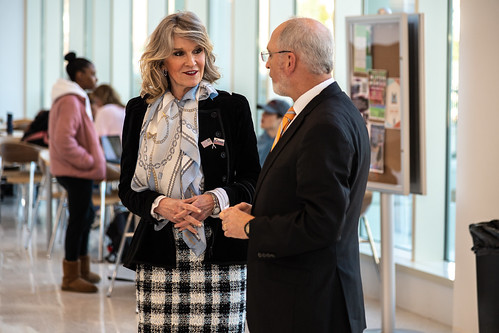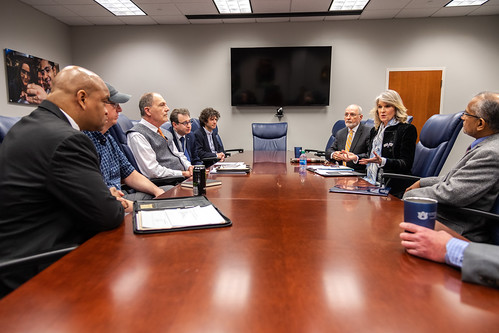U.S. ambassador and Auburn alumna tours Samuel Ginn College of Engineering, commends Auburn’s cyber focus
Article body
U.S. Ambassador to Slovenia Lynda C. Blanchard heard about Auburn University’s expertise in cybersecurity and artificial intelligence on a return visit Friday to her alma mater.
“I am proud that Auburn is one of the universities that is truly cyber-focused,” said Blanchard, a 1991 graduate of Auburn, to a group of faculty and students.
In addition to her role as CEO of the 100X Development Foundation, Blanchard founded and was a senior advisor of the B&M Management Company, a real estate investment firm valued at more than $1 billion. Blanchard worked in 15 different countries and spent six years on Capitol Hill before becoming the U.S. ambassador to Slovenia. To this day, Blanchard credits Auburn for setting the stage for her success.
“Thanks to Auburn University, I was prepared with a solid background, earning my degree in mathematics and a minor in computer science,” she said.
Associate Dean for Research Steven Taylor with Auburn’s Samuel Ginn College of Engineering and Auburn Executive Director of Public Affairs Brian Keeter discussed several key topics with the ambassador and gave her a tour of Auburn’s new Brown-Kopel Engineering Student Achievement Center.
“Our new center has one large makerspace room where students will be able to create models in metal, wood and polymers,” Taylor told the ambassador. “One of our missions is to provide the best student-centered experience in America. This unique experience for students in the Samuel Ginn College of Engineering has helped us double our enrollment in the last decade to more than 6,600 students.”
Blanchard spoke with Auburn representatives about Slovenia’s focus on science and technology, and she also discussed the importance of cybersecurity and national security—topics that Keeter said are important to Auburn’s mission forward.
“Auburn is woven into the fabric of our national homeland security,” he said, noting how Auburn has recently developed several strategic partnerships and hosted high-level federal government speakers.
The ambassador also heard of the diversity of Auburn’s faculty, specifically in the Department of Computer Science and Software Engineering.
“From Montgomery to Moscow, our dynamic faculty is diverse, and 48 percent of our faculty has expertise in cybersecurity,” said Hari Narayanan, the department chair.
The faculty spoke about their research areas and explained how students are prepared for rewarding careers.
“The Samuel Ginn College of Engineering is one of 450 colleges of engineering in the United States and the 23rd largest,” Taylor said. “We are producing engineering talent directly for tomorrow’s workforce.”
Blanchard invited the computer science faculty to Slovenia for a future meeting and further discussion.
“As the Chief of Missions, I enjoy focusing on teamwork, diversity and inclusion,” she said. “We are a family of ambassadors much like the Auburn Family.”
The ambassador then met with undergraduate to doctoral-level students working on such research areas as national security and defending networks at national labs.
“My advice to you is to step out to step up,” the ambassador told the students. “I encourage you to keep learning and take advantage of every opportunity you get. I did not know that I would become the U.S. ambassador to Slovenia. I never stopped learning and trying new things. Recently, I led a conversation ranging from cybersecurity to logistics to artificial intelligence at the United States European Command in Stuttgart, Germany, with more than 20 generals. Go through every door in your future because you don’t know where it will take you.”
Related Media
Media interested in this story can contact Communications Director Preston Sparks at (334) 844-9999 or preston.sparks@auburn.edu.
Auburn University is a nationally ranked land grant institution recognized for its commitment to world-class scholarship, interdisciplinary research with an elite, top-tier Carnegie R1 classification, life-changing outreach with Carnegie’s Community Engagement designation and an undergraduate education experience second to none. Auburn is home to more than 30,000 students, and its faculty and research partners collaborate to develop and deliver meaningful scholarship, science and technology-based advancements that meet pressing regional, national and global needs. Auburn’s commitment to active student engagement, professional success and public/private partnership drives a growing reputation for outreach and extension that delivers broad economic, health and societal impact.






